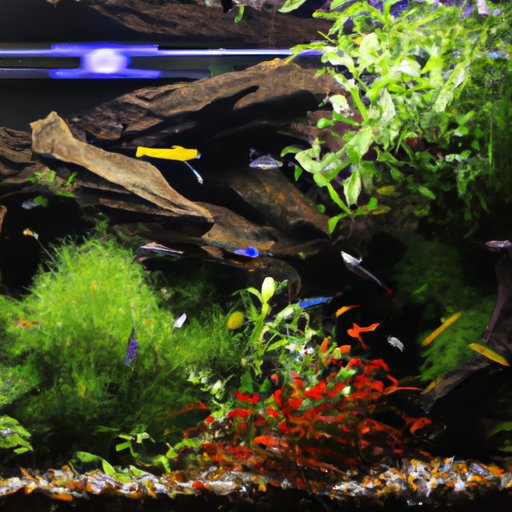Introduction
If you are an aquarium enthusiast, then you know that one of the most common problems people encounter is algae blooms. Algae can take over an aquarium quickly, making it difficult to maintain a healthy aquatic ecosystem. But what if the answer to this problem lies in the fish themselves? Do fish eat algae, and if so, can they help keep algae levels in check? This article will explore the role of algae in a fish’s diet and provide tips on how to keep your aquarium free of harmful algae blooms.
Exploring the Diet of Fish: What Do Fish Eat, and Does That Include Algae?
Fish have a varied diet that includes both plant and animal matter. They typically consume small invertebrates such as worms, insect larvae, plankton, and crustaceans. Some fish also feed on other fish or even their own eggs. Depending on the species, some fish may also consume vegetation such as algae, plankton, and detritus. A fish’s diet will vary depending on its size, habitat, and availability of food sources.
In general, fish need between 1-3% of their body weight in food each day. However, this number can vary depending on the species, age, and size of the fish. For example, smaller fish need more frequent meals than larger fish, and juvenile fish may require up to 5% of their body weight daily.
So, do fish eat algae? The short answer is yes. Algae are an important part of a fish’s diet and can provide essential nutrients, vitamins, and minerals. In fact, many species of fish rely on algae as a major food source. Herbivorous fish, such as plecostomus and otocinclus, will actively seek out algae to consume, while omnivores may nibble on algae here and there. Algae can be found in both freshwater and saltwater aquariums, so no matter what type of aquarium you have, your fish can benefit from consuming algae.
How To Control Algae Blooms in Your Aquarium Through Proper Fish Feeding Habits
While algae can be beneficial to your fish, too much of it can lead to an unsightly, unhealthy aquarium. Algae blooms can occur when there is an imbalance in the aquarium’s nutrient levels, often caused by overfeeding or inadequate filtration. To prevent this, it’s important to establish a proper feeding routine for your fish. It’s best to feed them small amounts several times a day rather than one large meal every few days.
You should also make sure to feed your fish a variety of foods, including commercial pellets, flakes, fresh vegetables, live brine shrimp, and algae wafers. This will ensure that they are getting all of the nutrients they need without overloading the tank with excess food. Additionally, you should limit the amount of light the tank receives to reduce the growth of algae.

A Guide to Different Types of Algae and the Best Types for Feeding Fish
There are many types of algae that can be found in aquariums, including green algae, brown algae, red algae, diatoms, and cyanobacteria. Each type has its own nutritional value and can provide essential nutrients for your fish. Green algae, for instance, is high in protein, carbohydrates, and vitamins A and B. Brown algae, on the other hand, is rich in calcium and iron.
When it comes to feeding your fish algae, it’s best to stick to the green and brown varieties. These types of algae are generally considered to be the most nutritious and have the least potential to cause an algae bloom. You should feed your fish only a small amount of algae at a time and monitor the tank carefully to ensure that the algae levels remain under control.

The Role of Algae in Establishing a Healthy Aquatic Ecosystem
Algae plays an important role in maintaining a healthy aquatic ecosystem. It helps to filter pollutants from the water, absorb excess nutrients, and provide food for other organisms. Algae can also provide shelter for small fish and invertebrates. Having a variety of algae in your tank can create a more balanced environment and help keep your fish healthy.
Do Fish Need Algae To Survive?
Although algae can be beneficial to fish, it is not necessary for their survival. Fish can obtain the nutrients they need from other food sources, such as commercial pellets, flakes, and live brine shrimp. However, algae should still be included in their diet as it can provide important vitamins and minerals that are not found in other types of food.
According to researcher Dr. William O. McLarney, “Algae are an important part of a fish’s natural diet and can provide them with essential nutrients, vitamins, and minerals. In addition, algae can help to establish a balanced aquatic ecosystem and provide food for other organisms.”
Conclusion
In conclusion, fish do eat algae and it can be beneficial to include it in their diet. Algae can provide essential nutrients, vitamins, and minerals, as well as help to maintain a healthy aquatic ecosystem. However, it’s important to monitor your aquarium carefully to prevent algae blooms and keep the levels in check. By following the tips outlined in this article, you can ensure that your fish get the nutrition they need without overloading the tank with excess food.
By understanding the role of algae in a fish’s diet, you can create a healthier, more balanced aquarium environment for your fish. With the right feeding habits, you can help keep algae levels in check and maintain a thriving aquatic ecosystem.
(Note: Is this article not meeting your expectations? Do you have knowledge or insights to share? Unlock new opportunities and expand your reach by joining our authors team. Click Registration to join us and share your expertise with our readers.)
